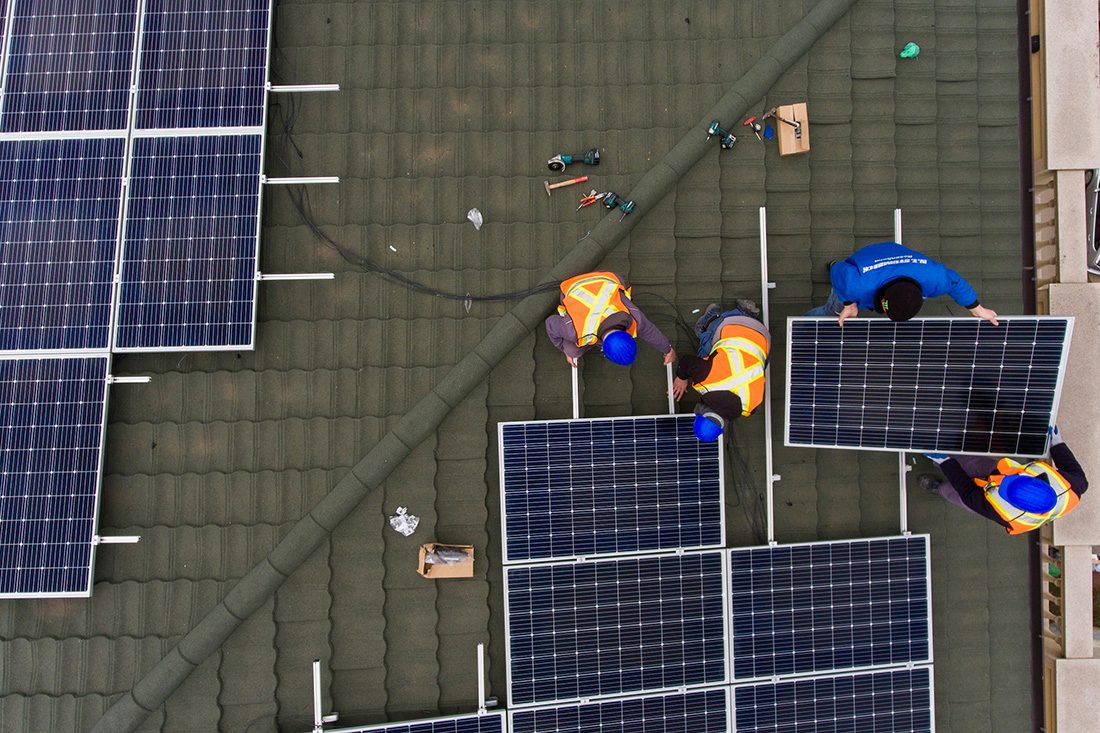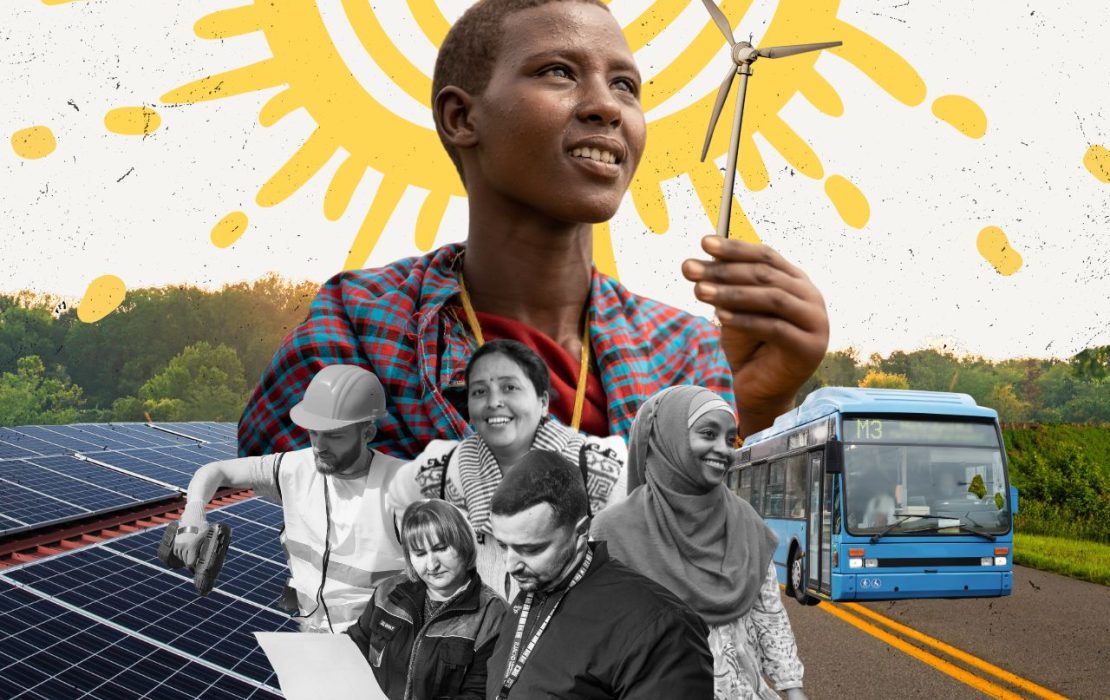
Photo: UNDP Kosovo*
New York, July 2 – A new study published today shows that coupling renewable energy targets with supportive development policies and investments would have major financial benefits. Such a shift would unlock US$20 trillion in cumulative savings in the energy sector, increase GDP by 21 percent, and increase average per capita GDP by $6,000 by 2060, compared to a business-as-usual scenario.
The study, conducted by the United Nations Development Programme (UNDP), University of Denver’s Pardee Institute and Octopus Energy, set up to explore how time-bound renewable energy targets, backed by coherent policies and financing mechanisms, could unlock triple wins: cutting emissions, boosting economies and delivering real social benefits.
Although the development benefits of renewable energy and energy efficiency are widely recognized, it is less known to what degree they can offer quantifiable benefits when coupled up with broader policy measures. This includes the specific assessment of countries’ national climate plans under the Paris Agreement, or Nationally Determined Contributions (NDCs). To quantify the benefits of these national targets, the study simulated three scenarios and compared outcomes.
In the first scenario (the Base Case), the world continues on a business-as-usual pathway, failing to scale up ambition over time. The world’s reliance on fossil fuels remains moderately high by 2060, covering over 50 percent of primary energy production. Such a pathway is unsustainable, pushing global warming towards 2.6°C and threatening progress on energy access, education, safe water, sanitation and nutrition – potentially pushing hundreds of millions into extreme poverty.
The second scenario (achieving renewables acceleration) looks at what would happen if the renewable energy transition accelerated in line with the decision at the first global stocktake which calls on countries to triple renewable energy, double energy efficiency and phase out fossil fuels. In this scenario, the world’s reliance on fossil fuels is much lower, covering 12 percent of primary energy production by 2060. This pathway would put the world on track to limiting global average temperature rise to below 2°C.
Finally, the third scenario (achieving both renewables acceleration and development targets) builds on the renewable energy transition with system-wide investments and policies aligned with the Sustainable Development Goals (SDGs). Relative to a business-as-usual pathway, the third scenario is projected to achieve universal access to electricity and clean cooking, lift 193 million people out of extreme poverty, save 142 million people from facing malnutrition and give 550 million more people access to clean water and sanitation.
Coupling renewable energy targets with supportive development policies and investments would have major financial benefits as well. The third scenario could provide cumulative savings of $20.4 trillion – with $8.9 trillion coming from energy efficiency and another $11.5 trillion coming from lower renewable energy costs.
“Today, the world faces a dual challenge: advancing human well-being while mitigating the environmental impacts of fossil-fuel-driven development,” said Cassie Flynn, Global Director of Climate Change at UNDP. “This study shows us that a clean energy future is possible – but we must choose to embed renewable ambition into climate plans linked to inclusive development policies.”
“Renewables can offer the chance to bring electricity to hundreds of millions of people, improving lives and driving growth", said Greg Jackson, Founder of Octopus Energy. "This study shows clean energy can unlock potential where it’s been held back for too long.”
To meet the goals of the Paris Agreement, the world needs a rapid transformation of its global energy system towards cleaner, and more efficient forms of energy, alongside other critical areas, including adaptation, resilience and nature-based solutions. These transformations also need to happen in the context of a broader development framework, where renewable energy expansion unlocks dividends for human and economic development.
"To build the future our children deserve, we must be thoughtful and strategic in our priorities,” remarked Jonathan Moyer, Director of the Pardee Institute. “This research shows it is possible to balance global development with environmental protection while managing the inherent trade-offs. The imperative now falls to global leaders to embrace these strategies and act."
Clean energy investments are set to reach a record-breaking $2.2 trillion in 2025, outpacing fossil fuels for the second year in a row. Renewable power capacity hit 4,448 GW, accounting for over 90 percent of new power additions. Technological advances in solar, wind, and storage are helping to drive this shift.
But fossil fuels still dominate, making up over 70 percent of global energy supply. In 2024, global energy demand rose by 2.2 percent, and while renewables led this growth, fossil fuels still accounted for 54 percent of the increase. At the same time, energy efficiency improvements stalled, growing by just 1 percent — half the pace of the previous decade.
To learn more about the study, click here.
***
About UNDP
UNDP’s Climate Promise is the UN system’s largest portfolio of support on climate action, working with more than 140 countries and territories and directly benefiting 37 million people. This portfolio implements over US$2.3 billion in grant financing and draws on UNDP’s expertise in adaptation, mitigation, carbon markets, climate and forests, and climate strategies and policy. Visit our website at climatepromise.undp.org and follow us on X at @UNDPClimate.
About Pardee Institute
Pardee Institute builds and uses data and tools to analyze our complex world and the long-term dynamics of change in human, social, and natural systems. We share our resources with policymakers, academics, and others seeking to improve the ways we contemplate and plan for the global future. Our flagship tool is the International Futures (IFs) model, which combines interconnected models across multiple domains: agriculture, demographics, economics, education, energy, environment, gender, governance, health, infrastructure, international politics, and technology.
About Octopus Energy
Octopus Energy Group is a global clean energy and tech business, driving the affordable, green energy system of the future. It serves over 10 million customers globally, is present in 32 countries and operates a £7bn portfolio of renewable energy assets. Its proprietary clean tech platform, Kraken, is at the heart of its growth and is contracted to serve over 70 million accounts across the globe. With $2.3 billion in funding from energy firms, pension funds, and global investors, Octopus is valued at around $9 billion. For more information, check out our website.
Media contacts
UNDP: Mehmet Erdogan - mehmet.erdogan@undp.org - +1 917-256-9945
Octopus Energy Group: press@octoenergy.com - +44 (0)20 4530 8369
* References to Kosovo shall be understood to be in the context of Security Council resolution 1244 (1999)
